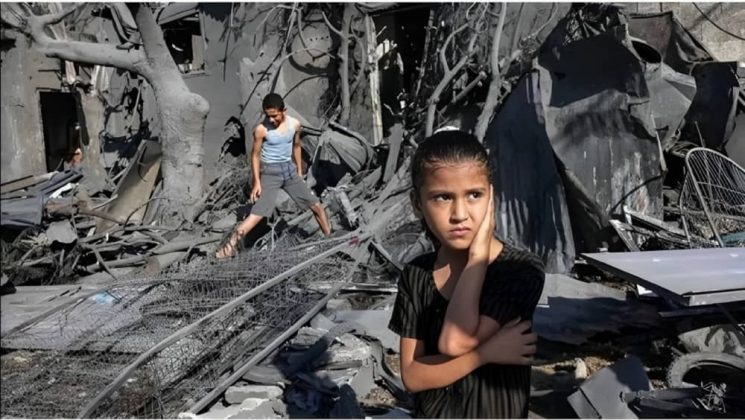Why State Officials Boast About Iran’s Role in the Middle East Crisis

war in Gaza children
Three minutes read
Written by
Mahmoud Hakamian
Despite consistent denials by top officials, including the Supreme Leader of the Iranian regime, regarding any involvement in the October 7 attacks, they convey a completely different narrative to their domestic audience. The Iranian regime, despite relying on a four-decade policy of appeasement and inaction in the international community, shows a greater concern for internal factors than for international consequences. This concern revolves around a society that has witnessed numerous uprisings, both nationwide and local, since 2017. The regime is apprehensive about the very forces that, despite receiving significant funds to suppress an impoverished population, foresee a bleak future.
On November 24, Ezzatollah Zarghami, the Minister of Tourism in Ebrahim Raisi’s government, said on state television: “During my tenure overseeing missile production, I traveled to the region, working with both Hezbollah and the Palestinians in the same underground tunnels where they are currently engaged in conflict. This happened about six or seven years ago. Inside these tunnels, I conducted classes, teaching them how to use missiles and their features. Many of these classes were deemed successful.”
Ezzatollah Zarghami, the #Iranian regime's Minister of Tourism and Cultural Heritage, admitted on live state TV that he personally engaged in training and arming militias, visiting their underground tunnels. #GazaConflict pic.twitter.com/eUyRumqu5R
— NCRI-FAC (@iran_policy) November 24, 2023
On November 18, Ali Saeedi Shahroudi, the head of the Political-Ideological Office of the Commander-in-Chief (Ali Khamenei), stated on the state Baran TV: “Now they openly say that the mindset and the resilient heart are in Iran. They say that Iran is the pole of the Islamic world, the pole of the global revolution, and our Islamic state is guiding and leading this movement in the world. They know what events have taken place. They wonder where these weapons and capacities that Hamas and Palestine have today originated.”
On November 24, the regime’s president Ebrahim Raisi said, “The normalization of relations [between Arab countries and Israel] is completely closed. In my opinion, and many issues like this, the situation and conditions have completely changed. Many equations have been disrupted, and my interpretation is that the Al-Aqsa Storm … will surely disrupt the equations of Islamic countries, regional countries, and the world.”
On November 24, Mohammad Taghi Osanlou, a commander of the Islamic Revolutionary Guard Corps (IRGC), stated on the state-run Eshraq TV, “Today, our levees are located two thousand kilometers away, and the war is happening there. Afghan, Pakistani, Iraqi, and Syrian fighters, in Lebanon, Syria, and Palestine, everyone is fighting. The war that we initiated continues, and God willing, it will expand.”
On November 25, Ghorbanali Dori Najafabadi, the representative of the Supreme Leader in Markazi Province and former Minister of Intelligence in the regime, said on Aftab TV, “You think we are alone? The strategic depth of the state is in Gaza, Lebanon, Yemen, Syria, Iraq, Afghanistan, the Indian Ocean, and the Sea of Oman.”
In mid-October, Hossein Amir-Abdollahian, the Foreign Minister of the regime, said, “If we don’t defend Gaza today, tomorrow we will have to confront phosphorus bombs in our own cities.”
#Iranian regime’s FM officially expresses ownership of the #Gaza crisis pic.twitter.com/IVqMPSkhPC
— NCRI-FAC (@iran_policy) October 19, 2023
However, alongside the bold rhetoric, certain officials of the terrorist regime are more frankly expressing tangible outcomes that war-mongering achieves for their regime.
On November 29, Parviz Sorouri, a former member of the regime’s parliament and the leader of a group known as “Rahpuyan,” stated in a media interview, “I believe that currently, the Operation al-Quds Storm cannot be without consequences for the parliamentary election process. This issue can be influential in our elections in the future. If the Hamas movement emerges victorious, it will change the atmosphere of the country and the region, impacting the elections positively. On the other hand, if, God forbid, it faces defeat, it will have a negative impact.”
On November 28, the IRGC-affiliated Hamshahri Daily wrote, “Since the commencement of the war in the occupied territories, there has been a cessation of provocations by dissenters. This is primarily attributed to the involvement of the Zionist regime as the chief financial and logistical supporter of these movements. Consequently, in the last 50 days or so, there has been a noticeable tranquility in public sentiment. Instances of agitation by anti-revolutionaries have been met with complete disregard from society.”
The newspaper added, “The hypocrites (the regime’s pejorative to slander the Mujahedin-e Khalq Organization) are among the dissenting movements that played a central role in fueling unrest in the country during the autumn of 2022. Over the past year, they have endeavored to create a suitable ground for the country to return to turmoil through various provocations.”
On November 13, political and security analyst Ahmad Ghaderi Abyaneh stated on the state-run Afagh TV: “The Al-Aqsa Storm offered divine assistance by preventing the recurrence of the uprising in 2022, and this divine aid was entirely advantageous for Iran.”
On November 26, Javad Enayat, the governor of South Khorasan, remarked on Birjand TV, “Whenever there is disturbance or fluctuations in the Islamic Republic of Iran, there is no turmoil or problems in other parts of the Islamic world, such as Yemen, Palestine, Lebanon, Iraq, Syria, and countries on the front lines of resistance. Over there, the United States and its allies live in peace and tranquility. Why? Because the axis of Islamic awakening, namely the Islamic Republic of Iran, is facing problems internally. Whenever we witness stability, security, tranquility, unity, and cohesion in Iran, the opposite is proven. At that time, the forces of resistance can engage with the United States and its lackeys.”
Why State Officials Boast About Iran’s Role in the Middle East Crisis

